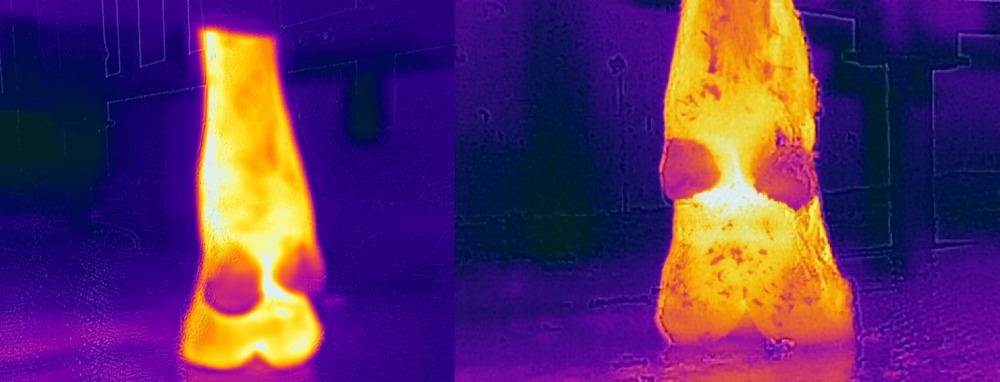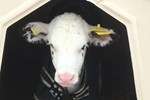New Royal Veterinary College study finds low-cost thermal image devices could be as effective as expensive alternatives in detecting lameness in dairy cattle
The research reveals that the low-cost devices could be as effective as diagnostics that are up to 50 times more expensive

A new study, led by the Royal Veterinary College (RVC), has determined that low-cost thermal imaging devices show minimal difference in effectiveness of detecting lameness in dairy cattle when compared to more expensive devices. The effectiveness of cheaper devices could result in wider use amongst farmers, vets and hoof trimmers helping to identify lameness earlier.
Lameness is a highly prevalent issue in the UK with 20-25 per cent of cattle affected nationally, this large proportion of affected dairy cattle costs the industry approximately £53.5 million each year. Therefore, the findings of this study could have many resulting benefits for farmers and the dairy industry by reducing the high economic costs of the condition and increasing cattle welfare.
The study, led by RVC undergraduate veterinary student, Aidan Coe, alongside Dr Nicola Blackie, a senior lecturer in Production Animal Science at the RVC, compared the thermal images of 83 cows’ hind feet, captured with both high and low cost thermal imaging devices. Very little difference was identified in the performance and quality of the devices despite the low-cost device being 2% the cost of the high cost device. Images captured suggested that low-cost thermal imaging devices would be the most cost-effective choice to aid in the identification of lameness.
This study highlights the effectiveness of cheaper infrared thermal imaging devices in identifying the condition which has the potential to lead to the wider use of the devices by farmers, vets and hoof trimmers, in turn allowing the condition to be identified earlier. Whilst high-cost devices have sometimes been used to detect lameness in cattle, the price point of up to £20 000 and fragility has previously limited their usefulness in a farm setting.
Aidan Coe, Undergraduate Veterinary Student at the RVC, and lead researcher on this paper, said:
“There is a possibility that low-cost infrared thermal imaging devices could be used as an objective, cost-effective method of assessing the lameness of the national herd, which may prove a useful adjunct to the current lameness detection methods.”
Dr Nicola Blackie, supervisor on the project and Senior Lecturer in Production Animal Science at the RVC, said:
“At the RVC we are proud to be able to support the research of all of our students no matter the stage of study they are at. It is the work and dedication of researchers like Aidan that lead to significant progress within the veterinary and farming industries.
This project has the potential to make early detection of lameness in cattle accessible to more of the farming population, with great economic and welfare benefits. By demonstrating the almost equal effectiveness of lower-cost thermal imaging devices to that of more expensive equivalents, this study helps make this technology available to much more of the farming population.”
Notes to Editors
Reference:
Coe A, & Blackie, N, Comparison of Low- and High-Cost Infrared Thermal Imaging Devices for the Detection of Lameness in Dairy Cattle. Veterinary Sciences. 2022’ 9(8):414. https://doi.org/10.3390/vetsci9080414
The full paper can be accessed at: https://www.mdpi.com/2306-7381/9/8/414
For media enquiries, please contact:
- Jasmin De Vivo jasmin.devivo@plmr.co.uk or rvc@plmr.co.uk
- Press Line: 0800 368 9520
About the RVC
- The Royal Veterinary College (RVC) is the UK's largest and longest established independent veterinary school and is a Member Institution of the University of London.
- It is one of the few veterinary schools in the world that hold accreditations from the RCVS in the UK (with reciprocal recognition from the AVBC for Australasia, the VCI for Ireland and the SAVC for South Africa), the EAEVE in the EU, and the AVMA in the USA and Canada.
- The RVC is ranked as the top veterinary school in the world in the QS World University Rankings by subject, 2022.
- The RVC offers undergraduate and postgraduate programmes in veterinary medicine, veterinary nursing and biological sciences.
- The RVC is a research led institution with 88% of its research rated as internationally excellent or world class in the Research Excellence Framework 2021.
- The RVC provides animal owners and the veterinary profession with access to expert veterinary care and advice through its teaching hospitals and first opinion practices in London and Hertfordshire.

